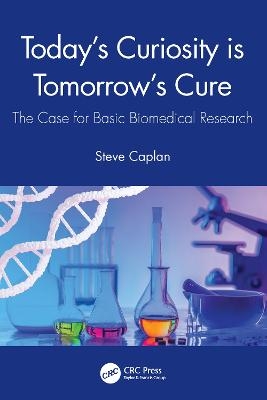
Today's Curiosity is Tomorrow's Cure
CRC Press (Verlag)
978-1-032-06508-3 (ISBN)
an engaging read, which will delight undergraduate and graduate students, as well as scientific researchers, it is full-throated advocacy of basic science. Illustrations and examples include the discoveries of penicillin and insulin, and the breakthrough elucidation of the genetic code. Providing both compelling rationale in support of basic science, and a fascinating look through the history of modern biomedical research, this book highlights with stirring examples why basic biomedical research is so important, and how so many key advances in medicine are derived from basic research. The book also offers a rationale for scientific inquiry and a broader understanding of the history of modern biomedical research missing from today’s classrooms.
Key Features
1) Provides clear explanations of great scientific discoveries
2) Illustrates connections between basic research findings and modern medicine
3) Includes compelling graphics/diagrams/illustrations
4) Accessible to the general public
5) Offers background for more specialized readers, including researchers as well as those with advanced degrees.
Related Titles
Staddon, J. Scientific Method: How Science Works, Fails to Work, and Pretends to Work (ISBN 978-1-1382-9536-0)
Helliwell, J. R. Skills for Scientific Life (ISBN 978-1-4987-6875-7)
MacRitchie, F. Scientific Research as a Career (ISBN 978-1-4398-6965-9)
Steve Caplan is Professor in the Department of Biochemistry and Molecular Biology at the University of Nebraska Medical Center, Omaha, NE. He also serves at the Director, UNMC Advanced Microscopy Core Facility at the University of Nebraska Medical Center and as Vice Chair for Administrative Affairs, Dept. of Biochemistry and Molecular Biology, University of Nebraska Medical Center, Omaha. His basic research has been consistently supported for more than a decade by the National Institutes of Health as well as other granting agencies. He has been the author or co-author of dozens of scientific peer reviewed journal articles.
Acknowledgments. Preface. Introduction. The Birth of Genetics. The Dawn of DNA. DNA as the Transforming Principle. The Structure of DNA Lends Itself to a Model for Its Duplication. Tying It All Together: tRNA, mRNA, Ribosomes, and the Genetic Code. The Practicality of PCR: The Technology that Drove the Biotechnology and the Molecular Biology Revolution. Genetic Engineering and Beyond: From Animal Models to Silencing RNA. CRISPR, a New Technique for Gene Editing. Connecting Mutations to Disease: Abnormal Proteins as a Cause of Disease. Penicillin: The Dawn of a New Age of Antibiotics. Easy to Stomach: The Gutsy Discovery that Helicobacter pylori Causes Ulcers. Insulin: A Hormone Controlling Metabolism. The Stem Cell: The Mother of All Cells. Antibodies: A New Way to Harness the Immune Response. Onto Oncogenes: Discovering the Molecular Basis of Cancer. The Age of Angiogenesis: Discovering How Blood Vessels Are Generated. Telling the Tale of the Telomere and Telomerase: The End of the End-Replication Problem. The Primary Cilium: Novel Functions for an Old Organelle. The Discovery of the Golgi Complex: A Pivotal Organelle with Multiple Functions. The Lysosome: A Trash Bin and End of the Road for Many Cellular Molecules. The Ubiquitin-Proteasomal Pathway: Targeted Protein Degradation and More. Receptor-Mediated Endocytosis: Gateway to the Cell. Mitochondria: The Metabolic Powerhouse of the Cell. The Light at the End of the Tunnel: Discovery of the Green Fluorescent Protein. Conclusions. Glossary of Terms. Bibliography. Index.
| Erscheinungsdatum | 11.11.2021 |
|---|---|
| Zusatzinfo | 4 Line drawings, color; 16 Halftones, color; 6 Halftones, black and white; 20 Illustrations, color; 6 Illustrations, black and white |
| Verlagsort | London |
| Sprache | englisch |
| Maße | 152 x 229 mm |
| Gewicht | 362 g |
| Themenwelt | Naturwissenschaften ► Biologie ► Genetik / Molekularbiologie |
| Naturwissenschaften ► Biologie ► Zellbiologie | |
| Technik ► Umwelttechnik / Biotechnologie | |
| ISBN-10 | 1-032-06508-7 / 1032065087 |
| ISBN-13 | 978-1-032-06508-3 / 9781032065083 |
| Zustand | Neuware |
| Informationen gemäß Produktsicherheitsverordnung (GPSR) | |
| Haben Sie eine Frage zum Produkt? |
aus dem Bereich


